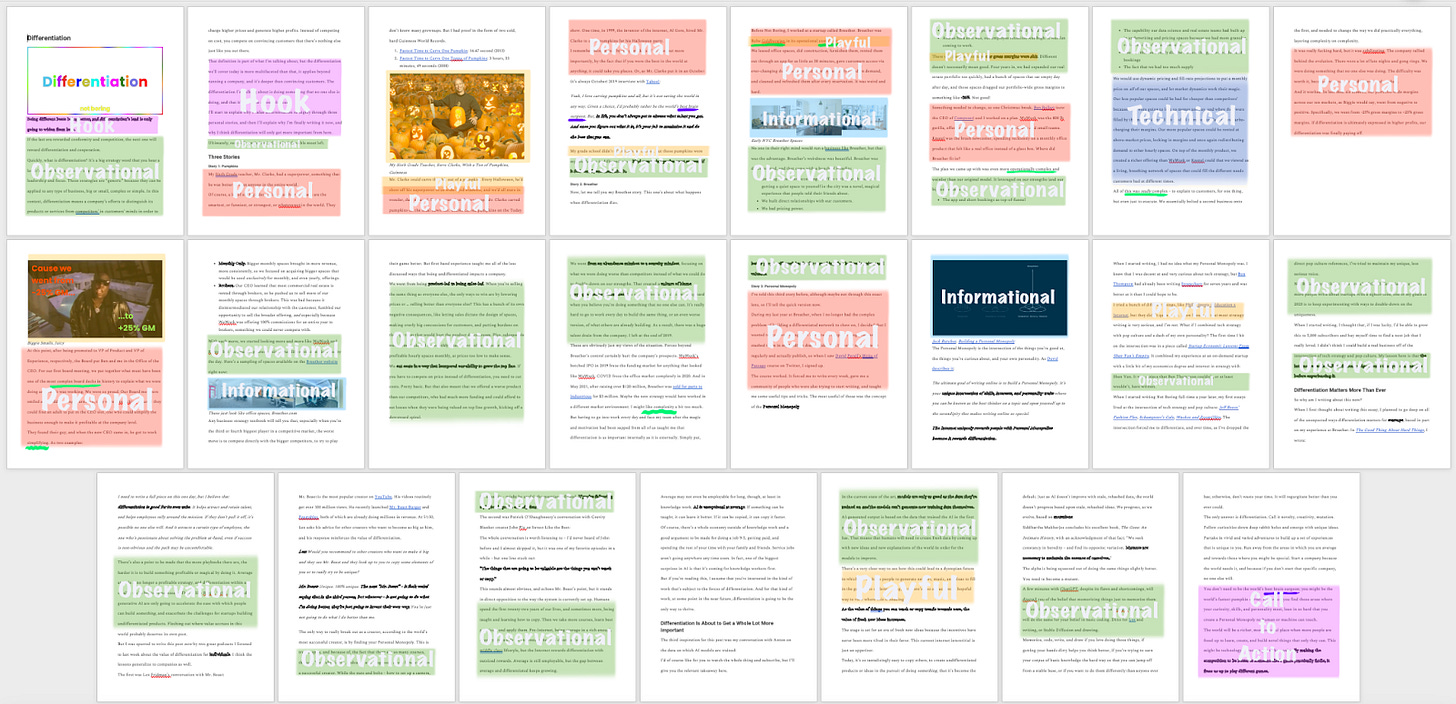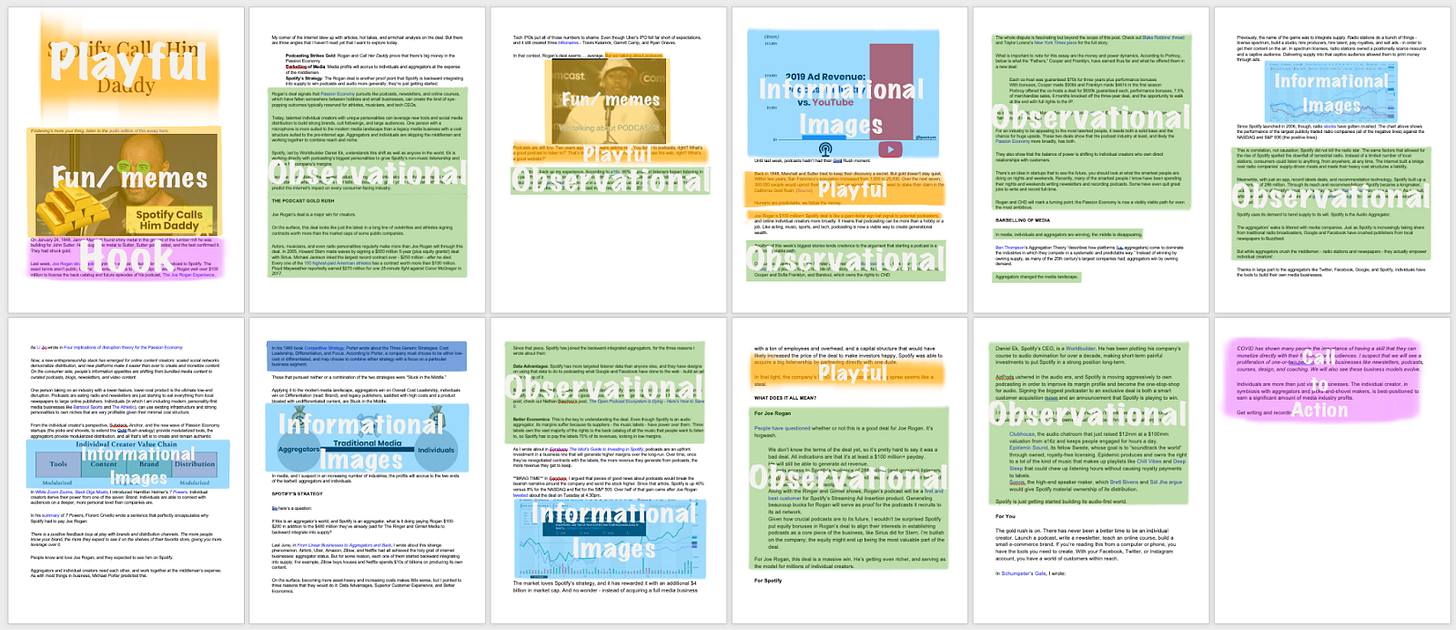Un-Packy-ng Technical Writing – The Not Boring Style
My lessons from studying Packy McCormick
Technically, writing is hard. Technical writing is harder. Reading said technical writing is the hardest.
Believe me.
I've had the distinct pleasure of pulling the remaining strands of my hair from their forlorn follicles while attempting to understand research papers and deep-dive blogs. These works of art would put NyQuil out of business. Imagine the unrivaled delight of trying to decipher paragraphs littered with jargon and equations written by a thirty-something-year-old with the panache of a three-year-old.
You are right in asking, "Who the hell are you to judge? Have you read your own drivel?"
Yes. I have. Too many times for my own good, in fact.
That's exactly why I'm writing about how we all can learn from a gentleman who knows a thing or two about technical writing.
Packy? Don't you write about AI, Sairam? Why are you analyzing Packy?
Let me tell you why. My collective business acumen comes from beating my friends and cousins in Monopoly. Yes, I've bought every hotel, railroad, and peg that game had to offer. Despite this pedigreed education, my brain isn't wired to understand economics, acquisitions, balance sheets, bonds (except 007), or small-cap investments, for starters.
So you can imagine my shock when I was three-fourths of the way through an essay before realizing it was about business strategy. Wait, why did I even read this? It took a few more moments for the aftershock to hit. Hang on, I actually understood this stuff!
Packy's work lives up to his newsletter's title: it's not boring. He masterfully blends memes, puns, pop culture, facts, and stories to both educate and entertain.
After reading a few more of his essays, my engineering brain kicked into action. Why does it work? Are there common threads here that I could use in my writing? Could all technical writing be this fun and functional?
What follows are some of the lessons I've learned about technical writing through Packy's brilliant essays.
Labyrinth Technica
Whether you write about finance, health, AI, engineering, or underwater basket weaving, one thing is common: All these subjects involve complex concepts, theories, and systems. These are about as easy to explain clearly as cutting your nails on a guillotine. Most people think they can do it. Some try. Only a few truly can1.
Take, for example, Packy's Shen Yun startup piece. When you read it, you forget that you're learning about the economic model that high-growth startups use, hoping to hit profitability. You're so mesmerized by the question, "What in the world does this dance performance have to do with startups?".
A layperson (read me) might worry about the background knowledge needed to understand everything in context. But before I can spend any more gray matter on worrying, Packy hits us with, "How does Shen Yun make any money? Short answer: they don't."
The only hook better than this one rests on the hand of a sea pirate battling a boy who never grows up and his fairy friend.
He then pulls out a P&L statement2 to show that this is indeed the case. In the short span of a paragraph, he's hooked you into reading the rest of the piece and gently introduced some financial concepts. It doesn't overwhelm you. Even if it does, there's enough of a hook to make you want to try to understand it.
Had he instead chosen to do a detailed financial analysis first and then conclude that Shen Yun isn't making money, I'd have switched off.
Therein lies the first nugget of wisdom I picked up. Introduce complex ideas to the reader in the right way and at the right place.
But that sprouts an interesting question. How do you do this for all readers? After all, not all readers are made equal.
The Juggling Act
Even if you're one of those rare breeds who can hook the reader instantly into your writing, the next challenge is considerably more daunting.
Your readers could be experts wanting a TL;DR, novices needing guidance, or even trolls eager to criticize. Walking the tightrope between being technically comprehensive while also being accessible is incredibly challenging.
Packy gives the TL;DR straight up front. In an unusual (for him) tell-and-then-show style, he gives a gist of what the essay is about. It's an easy decision for the reader to decide how deep they want to dive.
Take, for example, his piece on Spotify. Within the first one hundred words, he's already told you what the piece is about, which perspectives he'll cover, and why you should bother.
In an attention-driven economy, Packy's respect for the reader's time sets him apart.
But that's just the start.
What usually follows is a meandering train of thoughts, all connected to the central theme. Some of these meanderings might fly over your head. That's ok. There's always a "Joe Rogan's $100 million+ Spotify deal is like a giant dollar sign bat signal to potential podcasters." for the novices among us. There's always a story or a visual to put us at ease.
Reading Packy's work feels like you're in a conversation with him. Imagine sitting around a marbled oak table in a coffee shop, the aroma of freshly roasted beans wafting in the air, mild vibe music, and espresso machines humming in the background. You're sitting there listening to Packy muse about the economy and regale stories from past years. Whether you're a seasoned expert or a blue beginner, Packy speaks to you at your level3. You might not understand everything he says. That's ok. But you won't be sitting at the table feeling left out.
Do you know what's absolutely brilliant? You've probably never met him but feel like you've had dozens of conversations with him.
How does he do that?
The Drowsy Professor
In graduate school, I had a professor who'd sit in on other classes. He'd sit right up front. Within fifteen minutes of the lecture starting, it was lights out. He'd be out cold. Not that the lecture was bad or anything. It was just not engaging enough for him.
Engagement. The dreaded 10-letter word4.
Technical subjects feel boring, dry, and abstract. You can't LangChain an LLM and copywrite your way out of it. In creative writing, one can use metaphors, stories, analogies, and humor to keep readers' attention. It's harder to do in technical writing. After all, your intent is to educate first and entertain second.
Look at this image:
I highlighted the sh*t out of one of my favorite Packy essays, "Differentiation".
There's a beautiful balance between observational elements (facts, opinions, aha moments, etc.), personal stories, and playful elements ("My grade school didn't offer business classes"). There's clever repetition like, "Complex, Rube Goldbergian. Complicated…". This writing jumps off the page.
There are memes aplenty and several jokes too. But woven in between these elements is a clear and lucid explanation of the importance of differentiation (Not the calculus kind, but the business variety).
You might argue that one essay isn't statistically significant. I know your crafty mind. Thought you got me, eh? That's why I highlighted the sh*t out of another one too.
These pieces weren't chosen randomly. I chose pieces that were written years apart. The one above is his earlier work. Yet, some common threads endure. For example, he always gives the reader time to breathe. This is particularly important for casual and novice readers. After a few paragraphs of information density, there's usually a meme, a story, or a joke around the corner.
Digestible chunks.
The stories aren't random, either. Packy's earlier essays had many pop-culture references. His more recent work is devoid of them. That isn't accidental. That's by choice. Not everyone gets pop-culture references. That depends on one's upbringing and culture. But everyone gets stories. And Packy's essays are filled with them. Here's a story from his differentiation essay:
"Every Halloween, he’d show off his superpower to us wide-eyed students, and we’d all stare in wonder, duly amazed. But we were just the warmup. Mr. Clarke carved pumpkins on the local news. Mr. Clarke carved pumpkins on the Today show. One time, in 1999, the inventor of the internet, Al Gore, hired Mr. Clarke to carve pumpkins for his Halloween party.
I remember being awed, by the pumpkins of course, but more importantly, by the fact that if you were the best in the world at anything, it could take you places."

Stories and images are memorable. Tell me honestly, is that image of Mr. Clarke ever leaving your head?
The casual expert might wonder if Packy knows his stuff and if he's just filling pages with memes. That's when he drops infographics and technical knowledge in the piece. Take that, skeptics.
Like a pinch of pepper on a flavorful bisque, stories are sprinkled uniformly but just the right amount. The heart of the piece is always technically sound.
All this is sandwiched neatly between a strong hook and almost always a nice call to action for the reader.
There's an emotional resonance at play as well. Packy's writing makes us readers feel informed, entertained, and sometimes inspired.
Packy's writing has evolved over time. Some of my favorite pop-culture references are absent in pieces new. That's ok. The important stuff has endured. That's another lesson I've learned. It's okay to try things and evolve. Even when the subject you're writing about is as unchangeable as Nonna Maria's recipe for Spaghetti Marinara5 from 1923.
Mimicking Magic
Our world is filled with influencer keyboard warriors who faithfully re-regurgitate ChatGPT's memorized musings as their own, proudly showcasing their non-existent expertise. True technical writing is more important now than it ever has been. When technical writing is imbued with personality, when it's infused with playfulness, when it incorporates you, it comes alive. It becomes instantly readable.
Think about it. We read papers, blogs, and deep-dive essays to learn something new or to be inspired with fresh ideas. When the writing is robotic, pedantic, and drier than the Sahara, chances are that you leave the piece unfinished, frustrated, and wake up five hours later drooling over the keyboard.
Instead, imagine re-reading a piece because you didn't want to forget anything in it. Imagine discussing an idea with a colleague and instantly recollecting a vivid piece of imagery from it to explain a tricky concept to them. How amazing would that be?
Your readers deserve that. You deserve that. Packy's shown us a glimpse of what's possible when we do that. Now go and carve the sh*t out of that essay.
Bring your writing to life.
As a writer in this space, you require a deep understanding of the subject matter. If that isn't bad enough, you need the ability to convey these ideas to others. And not just convey everything. Convey only what is necessary. When it is necessary.
Told you I've learnt a few things from Packy's writing
T&C apply. Mutual Funds are subject to market risks. Please read the offer document carefully before investing.
Yes, I counted. I'm not an economist.
Store bought Arrabbiata! How dare you?




